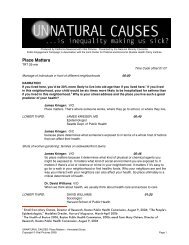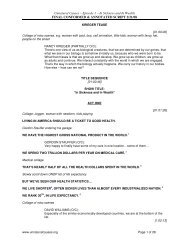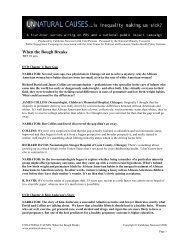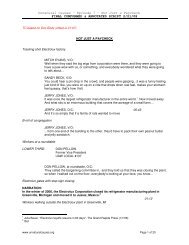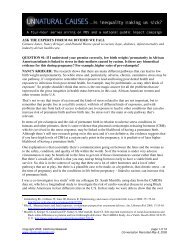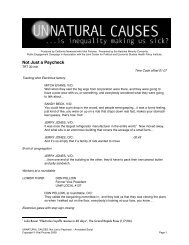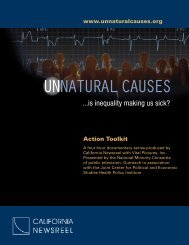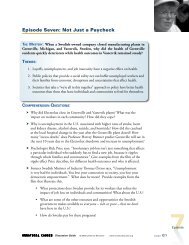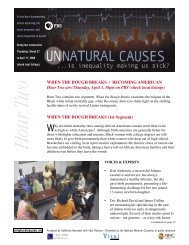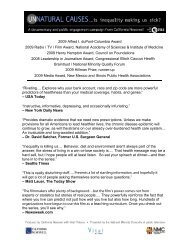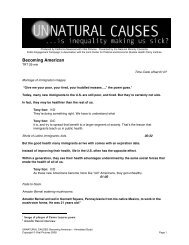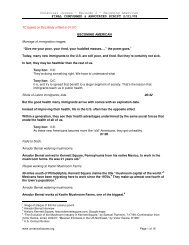Not Just a Paycheck - Transcript (pdf) - Unnatural Causes
Not Just a Paycheck - Transcript (pdf) - Unnatural Causes
Not Just a Paycheck - Transcript (pdf) - Unnatural Causes
- No tags were found...
Create successful ePaper yourself
Turn your PDF publications into a flip-book with our unique Google optimized e-Paper software.
Produced by California Newsreel with Vital Pictures. Presented by the National Minority Consortia.Public Engagement Campaign in Association with the Joint Center for Political and Economic Studies Health Policy Institute.<strong>Not</strong> <strong>Just</strong> a <strong>Paycheck</strong>TRT 30 minDVD Chapter 1: Plant ClosureMITCH EVANS: Well when they said the big wigs from corporation were there, and they were gonna have a powwowwith us, or something, and everybody wondered what they were going to talk about…SANDY BECK: You could hear a pin drop in the crowd, and people were gasping… It was a funny feeling, justkind of like, you were on up on a ride that drops down real fast, makes your stomach feel queasy, that’s how I felt.JERRY JONES: It was once the largest refrigerator manufacturer in the entire world. Now moved away. And whatsits is an enormous building that covers the acreage of a small farm.And it’s so empty that if a family of rats wanted to move from one end of the building to the other, they’d have topack their own peanut butter and jelly sandwich.DON PELLOW (Former Vice President, UAW LOCAL #137): They called the bargaining committee in, andthey told us that they was closing the plant, so when I walked out on the floor, everybody’s looking at your face, youknow…NARRATOR: In the winter of 2006, the Electrolux Corporation closed its refrigerator manufacturing plantin Greenville, Michigan and moved it to Juarez, Mexico. The Greenville workers earned $15.00 an hour, withabout $5.00 an hour in health and pension benefits. The Mexican workers made $1.57 an hour—plus busfare and lunch.JOHN HERNANDER (Stock Analyst, Sweden): Electrolux’s decision to move the plant from Greenville toMexico is basically just the result of them facing a very competitive environment. It is a disaster for many peoplewhen they’ve been laid off. But our view is more to look at the company. And, unfortunately, to say that sometimesthe stock market creates the pressure on the companies to act in that respect.NARRATOR: In a global economy, corporations move capital at breathtaking speed to maximize profit forshareholders. Electrolux is a multinational corporation based in Sweden. The company has also moved plantsfrom western to eastern Europe, in pursuit of the cheapest labor. Moving the Greenville plant to Mexico willadd 81 million dollars a year to the corporate bottom line. Good news for shareholders, many of whom arealready in the upper income brackets.But the 2700 people who once worked here lost a union job, a decent wage--and ultimately much more.RICK PRICE (Psychologist, University of Michigan): A lot of people are left behind. And when they’re leftbehind, they’re left behind with really diminished lives and with a whole array of health problems and stresses thatthey didn’t have beforehand.UNNATURAL CAUSES: <strong>Not</strong> <strong>Just</strong> a <strong>Paycheck</strong> Copyright © California Newsreel 2008www.unnaturalcauses.orgPage 1
DVD Chapter 2: Effects of Job LossNARRATOR: Rick Price is a psychologist who’s researched the impact of plant closings in Michigan fordecades. He’s studied the consequences of job loss for workers’ health.PRICE: Involuntary job loss isn’t just something that affects a particular individual who suddenly has got to find anew job, because it ripples through whole families and communities and becomes a major challenge and a major lifeevent and one that lots of them simply don’t recover from.NARRATOR: It’s not just happening in Greenville. All across the U.S., the transfer of work to low wagecountries undermines the kind of job security and benefits that made the American dream a reality formillions.Electrolux workers led a middle class life—owning homes, buying new cars and taking vacations. Now mostare scraping by on severance pay, unemployment benefits and a health plan that will end in a year. Aspersonal finances spiral downward, health follows.Two months after the closing, some of the laid-off workers meet at a local restaurant.BRENDA BISSEL (Machine Operator, 27 years at plant, Husband also lost job): When you gotta go tounemployment, I don’t know if that’s anxiety or what, but I didn’t really think about it until Marcella said today, likemy jaws been hurting, like I’m clenching my teeth or something when I’m sleeping.MITCH EVANS (Torch Operator, 29 years at plant): I get nauseated—I’ll be laying there, and I’ll just get – mystomach will be nerved, and I’ll be just nauseated…some nights I’ll wake up, and I’ll be up at one o’clock in themorning, I got up, was sitting in the chair and was watching TV until four o’clock, went and laid down, and tossedand turned until six o’clock and got up, and I don’t think I got two hours sleep all night.MARCELLA ORT (General Assembler, 38 years at plant, Husband also lost job): And I’ve started thinkingmore about needing a drink, which I don’t need, and I’ve stayed away from that, so then I go and eat. But, I havenever weighed this much in my life…PRICE: There are a lot of adaptive things we do in response to stress that long term produce liabilities for us. It’snot just people self-medicating for alcohol. It’s even chronic eating. They’re really treating themselves for anxietyand distress.MARCELLA ORT: I think it’s adding to Richard—his depression—because he’s having health problems, andhe’s old enough to draw social security and his pension, so he’s fortunate there, but I do think that he’s feeling likehe needs to do more, we don’t have anything coming in and he isn’t able to do more, so I think he’s getting moreand more depressed.DAN ELLISON (Clinical Social Worker, Spectrum Health United Memorial Hospital): I’ve been doing somethinking about some of the things that you were saying with regard to, I guess the best way I can say it is,depression. A little bit of ambivalence. Taking your medicines here or there.RICHARD ORT (General Assembler, 38 years at plant, Hospitalized for kidney problem): I don’t miss it toooften—DAN ELLISON: <strong>Not</strong> too often.RICHARD ORT: It’s just that some days, I just forget, it’s not that I do it intentionally.DAN ELLISON: OK. Your wife was laid off after almost 38 years. Your daughter was working there also, is thatcorrect? And she moved to Minnesota?UNNATURAL CAUSES: <strong>Not</strong> <strong>Just</strong> a <strong>Paycheck</strong> Copyright © California Newsreel 2008www.unnaturalcauses.orgPage 2
RICHARD ORT: Her husband and two of the kids already moved to Minnesota because he had a line-up on a job,cause there wasn’t any around here.DAN ELLISON: How big a financial impact is that for you? I mean, is it a stress?RICHARD ORT: I’ve got a set amount of money that’s coming in. She gets a pension, but the unemployment,she’s – in order to keep it, she’s gotta go to school, and she’s been out of school since—well we’ve been married 40years, so she’s been out of school for 40 years.ELLISON: We are seeing a lot of walk-ins to the ER, just coming in and saying they just don’t know how to copewith everything that’s going on in their life anymore.MARCELLA ORT (entering ER room): Nice to meet youELLISON: Medical issues are also increasing, cardiac or gastrointestinal issues that are related to stress andanxiety.DAN ELLISON (to Marcella): We were talking about some of the finances, the impact it’s had on him, on you,and how those stressors impact him. And my thought was, I’m seeing a lot more ambivalence of just: “whateverhappens, happens.”MARCELLA ORT: Right now we still have a little money there, but when it’s gone there’s no way to replace it.ELLISON: There’s worry about losing their home, losing some of their belongings, having things repossessed, notbeing able to meet the bills, not being able to afford their medication. They stop their medicines and I would thinkthat, usually the first one I see that gets stopped is the antidepressant… That just spins and cycles and becomesworse when they don’t have any hope.DVD Chapter 3: Stress under the SkinNARRATOR: In 2004 this local hospital treated 80 cases of depression, attempted suicide and domesticabuse. In the year following the Electrolux closing, that caseload nearly tripled.PRICE: These external life events do get under the skin. They do create changes in the way our psychophysiologicalsystem operates. They create elevated stressors – stresses responses that ultimately lead to both acuteand chronic health problems.NARRATOR: How do these stressors get under the skin? That’s one of the questions Sir Michael Marmotexplored for over more than thirty years in the Whitehall studies of British civil servants.MICHAEL MARMOT (Epidemiologist, University College): The two pathways that have most been studied(and we ourselves have also studied them) is the pathway that goes from the brain to affecting cortisol, and thepathway that goes from the brain to affecting adrenaline, epinephrine, the acute stress response.NARRATOR: When stresses just won’t stop--as bills keep coming, and there’s no hope for work--the level ofthese stress hormones can remain high.MARMOT: When you stress people in a prolonged way, you get changes to that cortisol pathway, and that seemsin turn to lead to a whole set of metabolic biochemical disturbances in the body.NARRATOR: High levels of cortisol can trigger increases in blood pressure, blood sugar and eveninflammation – all risk factors for disease.HARVEY BRENNER (Epidemiologist, Univ. North Texas; Johns Hopkins Univ.):UNNATURAL CAUSES: <strong>Not</strong> <strong>Just</strong> a <strong>Paycheck</strong> Copyright © California Newsreel 2008www.unnaturalcauses.orgPage 3
The types of illnesses that are associated with higher rates of unemployment are, first of all, the cardiovasculargroup of illnesses, and these are heart disease, stroke, kidney disease…many other illnesses involving alcohol,suicide, homicide, accidents and the like.NARRATOR: For forty years, Harvey Brenner has studied the relationship between unemployment anddeath rates. In reports for the US Congress and the European Commission, he developed models to predictwhat epidemiologists call ‘excess deaths’ - deaths that are over and above what would be expected underordinary conditions.BRENNER: Our research has shown over the years that there is a reasonably direct relationship betweenunemployment changes and mortality changes. These changes in mortality occur over about a ten year period but areheavily concentrated within the first five or six years.NARRATOR: At the time of the Electrolux closing, unemployment rates in Greenville’s Montcalm Countyjumped to 14%, nearly double that of the previous year. Among the twenty-two thousand households here,Brenner predicts that this surge in unemployment will result in 134 ‘excess’ deaths over the next ten years.GARY WHITE (Machine Operator, 32 years at plant): After my last day of work, I just thought, well, I haven’thad a vacation in thirty-two years I think I’ll take a vacation.And, um… The vacation got to the point where I started looking for jobs, started doing everything to find a job andthere aren’t any jobs anyway. You can’t even find a job at a third of what I was making before. I used to run aroundfeeling like a 25 year-old when I was working. I’m starting to feel my age now because I’m just sitting around notdoing anything.DVD Chapter 4: Loss of U.S. JobsNARRATOR: The free market environment that allows Electrolux to prosper comes at a price. 3 millionAmerican manufacturing jobs have been lost in the last ten years. Here, in Montcalm County, the declinestarted in the late 1980s with the closing of the Ore-Ida potato processing plant, the rise of corporateagribusiness and the demise of small family farms.JERRY JONES (Pastor, First Congregational Church): Many of those farmers already had been feeling someeconomic pinch. And their spouses often went to work for industry to have health insurance, or just to add to thefamily income. When they lost the manufacturing sector, then it kind of put a double-whammy on those families.TEXT ON SCREEN:Hitachi Magnetics: Closed 2005, 600 jobs lostGreenville Wire: Closed 2005, 150 jobs lostNorthland Corporation: Currently employs 115, down from 240 in the late 1980’s.Tower Automotive: Closed in 2006, 350 jobs lostMEIZHU LUI (Executive Director, United for a Fair Economy): In 1965, 1/3 of workers in the US hadmanufacturing jobs. Now it is under 13%. We used to make airplanes, we used to make steel, we used to make cars.Now we make beds; we make pizza; we make hamburgers. It’s quite a shift.NARRATOR: And a painful shift in wages. When Sandy Beck was a supervisor at Electrolux, she earnedover 21 dollars an hour. After Electrolux, she made 7 dollars an hour, with no benefits and no job security.For the first nine months after her layoff, Sandy received compensation from a federal program tied to theNorth American Free Trade Agreement. And Electrolux provided a severance package for her.UNNATURAL CAUSES: <strong>Not</strong> <strong>Just</strong> a <strong>Paycheck</strong> Copyright © California Newsreel 2008www.unnaturalcauses.orgPage 4
But now these supports have run out. Her future is anyone’s guess.SANDY BECK (Plastics Facilitator, 31 years at plant): I’m a little concerned that we can meet our budget, andhave enough money for taxes and emergency funds. Right now we’re busy paying bills off and cutting down ourmonthly budget.NARRATOR: Sandy is better off than most. Her husband Bruce was also laid off by Electrolux, but he has apension of about one half his former salary. And they live on a farm that’s been in Sandy’s family for threegenerations. It’s their safety net.SANDY BECK: My grandfather bought this beautiful farm on the lake back in 1917. Then my dad took over thefarming. And that was when the small farmers couldn’t make it, so he had to get a job at Electrolux to help makethings meet.NARRATOR: Sandy’s farm sits on Clifford Lake, a tranquil spot that middle class families long called home.But many are leaving, their houses leveled to make way for high end second homes - creating higherassessments and higher property taxes.SANDY BECK: We’re part of the eroding middle class that’s seen our income recede. It’s not good every year tosee your tax report and know that next year it’s going to be more than it was this year. First I didn’t like seeing bighouses in our hay field…but it’s part of life, and I’ve come to accept my neighbors now as OK people (laughs).DVD Chapter 5: Haves and Have <strong>Not</strong>sJERRY JONES: There’s something unfolding here in Greenville and all of Montcalm County that might have beenwhat Dickens was talking about when he said “the best of times, the worst of times”. Because we are having aneconomic boom in some sectors: there are new houses being built here that makes it into a bedroom community forsome of the larger areas around.We have had some national franchises move in here and build significant buildings here. At the same time, there’sthis loss of jobs in west central Michigan that goes far beyond Electrolux. And it seems to me like there’s a growingchasm between the haves and the have-nots.GORDON STAUFFER (Founding CEO & President, Northland Refrigeration): So, please join me. I’m veryhappy to finally have some of my cars in one location. So please join me. This is the addition of the house thatwe’re just completing…NARRATOR: Gordon Stauffer lives down the road from Sandy’s farm. His lakeside home is a showcase forthe high-end appliances his company manufactures.GORDON STAUFFER: Refrigerator/freezer. In stainless steel inside and out.NARRATOR: Stauffer is Founding CEO of Northland, one of Greenville’s last working factories. Hiscompany is riding a wave of new consumption by the wealthy.GORDON STAUFFER: We certainly anticipated that there would be growth in the super high-end portion of thehome appliance industry. There are probably more million-dollar homes built last year than any time in our history.And there is a lot of disposable income going to second homes, high-end second homes, and when they build thesehigh-end second homes they expect an icemaker; they expect a wine cooler. They expect all these high endappliances.GORDON STAUFFER (showing home): Pet food, ice for the pet’s water. The hot tub is right through thosedoors.UNNATURAL CAUSES: <strong>Not</strong> <strong>Just</strong> a <strong>Paycheck</strong> Copyright © California Newsreel 2008www.unnaturalcauses.orgPage 5
NARRATOR: Trends in the appliance industry reflect growing inequality in America. CEO salaries are nowmore than 250 times the average worker’s pay.LUI: The number of products produced per workers has actually gone up. However, workers have not shared in thebenefits of that greater productivity. It has gone to those at the top of the pay scale within the companies.DVD Chapter 6: Resources / ControlNARRATOR: And where you stand on the economic ladder is a good predictor of health.MARMOT: The higher the grade, the better the health. The lower the grade, the higher the mortality rate and theshorter the life expectancy in this remarkably graded phenomenon. So if you were second from the top, you hadworse health than if you were at the top; if you were third from the top, you had worse health than if you weresecond from the top – all the way from top to bottom.GORDON STAUFFER: I have been very blessed, and I’ve got exceptional health. I do like to work out, in fact I’mwaiting for this construction to be completed so that I can put my basketball court back in operation, because I stillplay basketball.NARRATOR: Stauffer and other wealthy Americans have more options, resources and power to control theirlives - all contributing to better health.GORDON STAUFFER: I told George W. that I had a photograph of myself with his mother, and he said ‘that’s theone to keep—keep that photograph….’There is a perception that the CEO gets all of the stress, actually if you’re a good CEO maybe you give the stress,rather than get the stress.MARMOT: Autonomy, control, empowerment… turns out to be a crucial influence on health and disease. Peoplewho are disempowered, people who don’t have autonomy, people who have little control over their lives, are atincreased risk of heart disease, increased risk of mental illness, in the Whitehall studies, increased risk of absencefrom work, and increased risk of decrements in functioning.GARY WHITE: You can’t effect change in your life right now. Because there’s nothing you can change. It’s alldepending on outside forces, and all you can do is try to work with outside forces.SANDY BECK: We have less control now than when we worked at Electrolux and made what I call very goodmoney. It’s kinda scary when we don’t have the money that we did have when those taxes go up.Living on the lake with the higher income people isn’t a plus in that situation. If we get really desperate, we mighthave to take the bitter pill and put some land up for sale ourselves, but we only want to do that if it’s the last resort.BRUCE BECK: I guess I’ve gotten up there where I don’t worry like everybody else does. I’m more privilegedthan some.SANDY BECK: Some people would say people like him that’s got one year to social security are the lucky ones.BRUCE BECK: Yeah, government’s not guaranteeing that either.SANDY BECK: No.NARRATOR: And there are no guarantees for Sandy’s marriage, which didn’t weather the Electroluxclosing well. Feeling pressured and depressed, Sandy’s husband left her for almost a year to carry on alone.UNNATURAL CAUSES: <strong>Not</strong> <strong>Just</strong> a <strong>Paycheck</strong> Copyright © California Newsreel 2008www.unnaturalcauses.orgPage 6
RICK PRICE: We do live in an individualistic society. We believe that people are individually and personallyresponsible for their own fate. We enact our laws that way. We create our social policy that way.NARRATOR: Wealth inequality is much more extreme here in America than in any other industrializednation. The top 1% of our population holds 38% of all personal wealth. And nearly one third of all corporatestock. And their tax rates are getting lower and lower.Is this the only way for a modern industrialized economy to operate? There are alternatives.DVD Chapter 7: SwedenNARRATOR: In 2004, Peter Stenberg lost his job when Electrolux moved a vacuum cleaner plant from hishometown of Västervik, Sweden to Hungary. Peter had worked at the factory for 21 years.But unlike the workers in Greenville, Peter isn’t stressed out, he hasn’t turned to drinking and he’s notworried about losing his house.PETER STENBERG (21 years at Electrolux): I’ve been studying psychology, computers, that sort of thing, butnow I’m looking for work. I think something good can come from this. It will give me a new start.NARRATOR: Like most of his coworkers who lost their jobs in Västervik, Peter has unemployment benefitsat 80% of his former salary. This support will continue as long as he goes to school or looks for new work.In Sweden, the costs of unemployment have been carefully calculated.THOMAS ÖSTROS (Minister of Industry, Sweden): Unemployment is very bad for individuals. You lose yourconnection in society, you lose your democratic empowerment, but you also suffer when it comes to health. And thatcreates of course, another discussion because it is a waste of resources to let people be laid off for long periods oftime, or unemployed for long periods of time. But it also costs even more if you don’t do anything.NARRATOR: During the last century, Sweden built a political system that distributes wealth to provideeconomic security to all its citizens.But it hasn’t been at the expense of prosperity. Sweden’s economy has kept pace with the U.S. for the last tenyears. And while its economic system rewards entrepreneurs, it also protects workers.ÖSTROS: Sweden is a country very much dependent on free trade. We can’t hide our production frominternational competition. But globalization also means greater demand on public policy and public efforts to see toit that it is an environment where it’s possible for individuals to live and to have a good life. And therebyglobalization also means that you must have taxes high enough to have resources to help people to get the skills, thesupport they need, to be able to come back.NARRATOR: Sweden continues to evaluate how much support to provide its citizens. For now, Swedes areguaranteed a college education, health care, five-weeks paid vacation, 16-months paid leave for new parents,and much more. And these policies seem to make a difference—the average Swede lives nearly three yearslonger than we do.For this security, Swedes willingly pay more taxes than Americans do. This helps to ensure that health is notdependent on personal income, wealth or job security.MARCUS KVANBERG (speaking in Swedish): If you look around, you’re so glad you live in Sweden. I can’timagine living on 50%. You wouldn’t know what’s going to happen to your children, your family, to everything…You’d have to sell the house, the car… no wonder people feel sick.UNNATURAL CAUSES: <strong>Not</strong> <strong>Just</strong> a <strong>Paycheck</strong> Copyright © California Newsreel 2008www.unnaturalcauses.orgPage 7
YVONNE TAMBOUR (speaking in Swedish): Who will they sell it to? Who? Who will move there if therearen’t any jobs?NARRATOR: Nearly 80% of Swedish workers are protected by unions. When Electrolux decided to movethe Västervik factory, the union and the government pressured the company to make restitution to theworkers and their community. The company responded with 3 million dollars to stimulate the creation ofstart-up businesses in Västervik.The city of Greenville, Michigan received nothing.CAMILLE PETERSSEN (speaking in Swedish): What’s left? Does it become a ghost town? What happens tothose people?Chapter Eight: A Shared FutureNARRATOR: The Swedish union workers raise the real question: What will happen to the unemployed inGreenville and why are the unemployed across America left to fend for themselves?DON PELLOW (Machine Operator, 32 years at plant, Wife also lost job): Every one of us here has at leasttwenty-five years in here over there at the plant; me and Gary thirty, Marcella forty. And you’re always working forthe future. That’s why you worked every day was for the future. And now there is no future.JERRY JONES: As a Christian I really do understand that we have a responsibility to the whole community. Tome, the notion of individualism is right in the face of caring for your brothers and sisters.RICK PRICE: Well the Scandinavians know something that we don’t know and they’ve known it since the middleof the nineteenth century. And that is, there’s a sense of shared social responsibility about the fate of workers.They’re not just sort of cannon fodder; they’re not just resources to be thrown away. And that really makes anenormous difference.ENDUNNATURAL CAUSES: <strong>Not</strong> <strong>Just</strong> a <strong>Paycheck</strong> Copyright © California Newsreel 2008www.unnaturalcauses.orgPage 8




